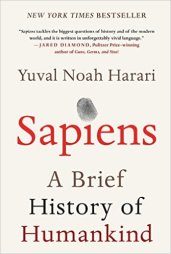[For those of you who do not get The Geneva Courier, here is the piece I wrote for the most recent issue. The published, edited version is here (on pp. 24-25): http://www.genevaschool.org/about-us/publications-media/courier/the-courier-september-2015/%5D
A History of Humankind
I hope your summer was a good one which included rest and achieving some goals. I usually try to do at least two things: get some rest and accomplish some “recreational” reading. So in addition to relaxing while on the shore of Lake Erie with family, I dug into some reading. First I read McCullough’s new biographical installment, The Wright Brothers (Simon & Schuster, 2015; highly recommended). Then I followed the crowds and read Harper Lee’s Go Set a Watchman (Harper. 2015; which validates Naomi Wise’s dictum advising against ever publishing a first draft! Stick with the old Atticus!). I also dipped into Turley’s Awakening Wonder: A Classical Guide to Truth, Goodness & Beauty; but what really got my attention up on Lake Erie was beginning to read Yuval Harari’s best seller Sapiens: A Brief History of Humankind (Harper, 2015).
Harari is an Israeli historian (Ph.D. from Oxford) whose book has been translated into 26 languages – that got my attention. Further, as an atheistic scholar (who, according to the bio, lives with his husband near Jerusalem and teaches at Hebrew University), his writing gives a window into the worldview of so many who believe and live by a story completely separate from the story we tell at Geneva. Though I have yet to finish the book, I find it incredibly intriguing and helpful in understanding our cultural moment.
At Geneva, we believe (consistent with historic Christian tradition) that God created the world with purpose and intention. His creation is a beautiful construction revealing God’s nature of order and beauty. We also believe that humankind is the pinnacle of his creation. We are made in God’s image (imago Dei) and as his image-bearers, he has given us a “creation mandate” to be fruitful and multiply, and have dominion as stewards over his creation. Further, we believe that humanity’s fall into sin has marred creation such that the whole creation (not just humans) longs for redemption, restoration, and reconciliation with our creator.
The other story is quite different, of course, and Harari articulates it well. When God is not real, there is no “creation.” Everything we know and see and experience is the random result of meaningless forces with no ultimate meaning other than what any particular culture may seek to impose upon our world. Humans are not special, nor actually essentially different than the rest of the animal world. Thus Harari asks how this particular slice of evolution, the species homo sapiens, has somehow risen to dominate the world as we know it (at least for now).
Harari contends that our species rose through the ability to created “imagined realities” such as money, religion, and even corporations – none of which are “real” in his mind – in order to give us a false sense of . . . well, order. “Culture,” he says, “tends to argue that it forbids only that which is unnatural. But from a biological perspective, nothing is unnatural. Whatever is possible is by definition natural” (p. 147). He goes on to say that “our concepts ‘natural’ and ‘unnatural’ are taken not from biology but from Christian theology” and as such do not apply to those who reject the Christian story. He freely admits that evolution has no purpose and that so much of human “history” is the story of one culture oppressing another for the sake of power and wealth (both imaginary illusions).
Harari is one of an ever growing number of “scholars” who “see culture as a kind of mental infection or parasite, with humans as its unwitting host” (p. 242). Wow! That’s a dismal view of things. So what does a secular evolutionary atheist hope for? I have already looked ahead toward the end of the book since the picture being painted is so hopeless. To my surprise, his hope (also articulated in a published interview) is that death will eventually be “optional.” Really! This is where human evolution is headed – victory over death and endless life . . . for an elite class who use the rest of human kind to serve and support them.
This made me think of Tolkien (naturally) in whose Middle Earth cosmology members of the Elvish race cannot simply die (though an Elf may be killed). And the Elves, interestingly enough, consider death to be a gift given by the creator to the race of men. Elves find endless life a dreary burden to bear from which there is no release and little joy (even if there is great beauty and achievement).
While we can stand in wonder at the great advancements of modern culture, mankind is still held in bondage to something relatively close to that biblical idea of three score and ten years in this life. Yet we believe that there is much more to life and the world than that which we can see and quantify. I am sure Harari is one of those who pities us as people of the Book who believe in the resurrection of the dead and the prospect of everlasting life. But such belief also gives meaning and purpose to our waking and sleeping moments. Life matters because God has decreed it so.
I am grateful that a summer of rest is a good thing and that God uses such times to energize us for our vocation at Geneva: educating the next generation and continuing the profoundly important task of inspiring students to love beauty in God’s world, think deeply about the significance of life, and to pursue Christ’s calling as we live on this earth.
